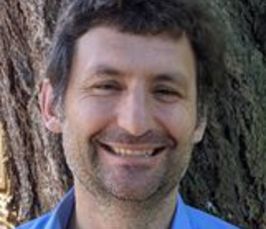Chemical challenges facing scalable hydrogen production with alkaline membrane electrolyzers
- Date: Jun 17, 2022
- Time: 03:00 PM (Local Time Germany)
- Speaker: Prof. Dr. Shannon Boettcher
- Department of Chemistry and Biochemistry at the University of Oregon
- Location: Building M, Richard-Willstätter-Haus, Faradayweg 10, 14195 Berlin
- Room: Seminar Room
- Host: Interface Science Department
- Contact: nikolaus@fhi-berlin.mpg.de

Alkaline-exchange-membrane (AEM) electrolyzers in principle offer the performance of commercialized PEM electrolyzers with the ability to use earth-abundant catalysts and inexpensive bipolar plate materials. I will present our fundamental work in understanding the chemical and electrochemical processes in earth-abundant water-oxidation catalysts, including the use of integrated reference-electrode device architectures and cross-sectional materials analysis, as well as progress in building high-performance AEM electrolyzers. Baseline systems operate at 1 A·cm-2 in pure water feed at < 1.9 V at a moderate temperature of ~70 °C using either IrO2 or Co3O4 anode catalyst layers, PiperION alkaline ionomers, and stainless-steel porous transport layers. These devices, however, degrade rapidly compared to PEM electrolyzers. The voltage profile corresponding to degradation has initial fast (~10 mV/h) and steady-state slow components (~1 mV/h), which we link to chemical and structural changes in the ionomer catalyst reactive zone. We further discover that dynamic Fe-based OER catalysts – that have world record performance in traditional liquid alkaline electrolyzer systems – perform poorly with enhanced degradation rates in alkaline membrane electrolysis, illustrating fundamentally different chemical design principles for OER catalysts. I will discuss these processes in electrolyzer devices and in model systems, as well as present promising new chemical strategies we have developed to mitigate degradation and enhance performance using novel ionomers and electrode catalyst compositions and architectures.
Biography:
Boettcher is a Professor in the Department of Chemistry and Biochemistry at the University of Oregon. His research is at the intersection of materials science and electrochemistry, with a focus on fundamental aspects of energy conversion and storage. He has been named a DuPont Young Professor, a Cottrell Scholar, a Sloan Fellow, and a Camille-Dreyfus Teacher-Scholar. He is a 2019-2021 ISI highly cited researcher (top 0.1% over past decade). In 2019 he founded the Oregon Center for Electrochemistry and the nation’s first graduate program in Electrochemical Technology. In 2021, he was named one of ten finalists for the Blavatnik National Award in Chemistry.